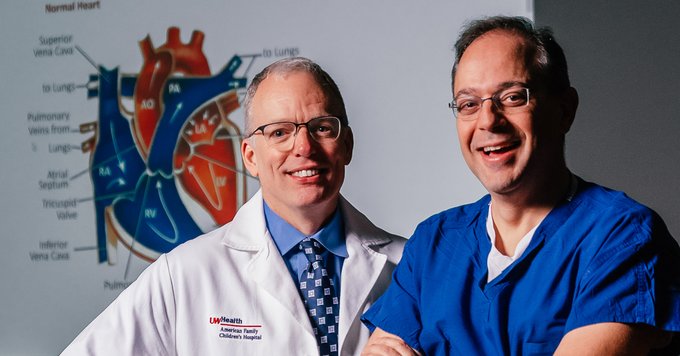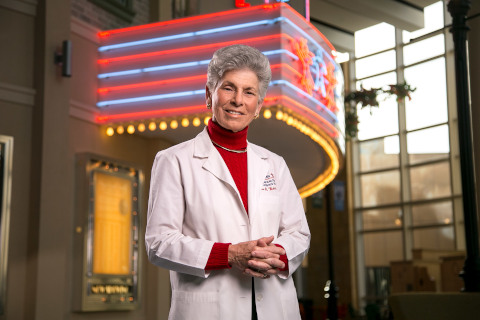
Few public celebrations in Madison, Wisconsin, have eclipsed the enormity of the grand opening of UW Health’s American Family Children’s Hospital (AFCH) in 2007. Featuring colorful, spacious patient rooms; a whimsical, child-friendly interior design; and the very latest in medical equipment and technology, this world-class hospital helped launch an extraordinary level of growth in pediatric specialty care, substantially improving the quality of life for thousands of children from Wisconsin and beyond.
Despite the magnificence of the new children’s hospital, something palpable was missing when its doors opened more than 12 years ago. A comprehensive pediatric heart program – an essential component for any state-of-the-art children’s hospital – had repeatedly proved elusive.
To be sure, UW Health had long been home to a highly skilled but small pediatric cardiology team. Without a first-class pediatric cardiac surgeon, however, the ceiling for growth was low. Instead of keeping its surgical patients in house, UW Health historically sent most of these children elsewhere – usually to the state’s only full-fledged pediatric heart program at the time, the Herma Heart Institute at Children’s Wisconsin (formerly Children’s Hospital of Wisconsin) in Milwaukee.
“Nobody questioned the excellence of care these children historically received in Milwaukee,” says J. Carter Ralphe, MD, chief of the Division of Pediatric Cardiology in the Department of Pediatrics at the University of Wisconsin School of Medicine and Public Health (SMPH). “We simply believed that kids from Madison and the surrounding region should be able to have their heart surgery closer to home.”
“Moreover, we have a great academic health system and a world-class university here,” adds Ralphe, who practices at American Family Children’s Hospital and leads a productive research team. “Why shouldn’t the University of Wisconsin- Madison have a comprehensive pediatric heart program?”
Building support for the heart program
Even before he was hired at UW Health in 2007, Ralphe had reason to feel encouraged. Ellen Wald, MD, Alfred Dorrance Daniels Professor and chair of the Department of Pediatrics, began laying the groundwork for a children’s heart program soon after becoming chair in 2006.
“A comprehensive pediatric heart program raises the entire profile of your children’s hospital,” notes Wald. “It changes the whole character of the place by allowing you to offer an advanced level of care to patients and a higher caliber of training to young physicians than otherwise would be the case.”

With Wald’s backing, Ralphe began rounding up support from the institution’s highest levels to realize his dream. Several players – also new to UW Health at the time – gave Ralphe their blessing. They included Donna Katen-Bahensky, then president and CEO, UW Hospital and Clinics (now UW Health); K. Craig Kent, MD, then chair, Department of Surgery; and Jeff Poltawsky, then vice president, American Family Children’s Hospital.
UW Health moved forward knowing that two momentous challenges lie waiting. First, the institution had to successfully recruit a superior pediatric heart surgeon. Second, UW Health needed to begin changing referral patterns to keep the new surgeon busy with little hearts to mend. Leaders knew that after decades of surgical referrals routinely flowing to Milwaukee, establishing trust by referring providers could be a challenge.
From 1999 to 2010, three cardiac surgeons took a turn at performing pediatric cases. The last of these three – a highly talented surgeon named Hani Hennein, MD – died unexpectedly in 2010 at age 52, just nine months after coming to UW Health.
“It was hard to build traction when the surgical side went through these unfortunate starts and stops,” says Ralphe, “Still, we learned valuable lessons from each experience, both inside the hospital and from referring providers. By the time we hired Petros in 2011, we had a strong foundation.”
Celebrating a turning point
“Petros” – whose name is usually spoken with reverence and great affection – is Petros Anagnostopoulos, MD, MBA, also known as “Dr. A.” for short. He was hired as UW Health’s chief of pediatric cardiothoracic surgery after training at the University of Pittsburgh and University of California, San Francisco (UCSF).
He also served on the faculty of Phoenix Children’s Hospital in Arizona and UCSF. “Pediatric heart surgery requires an extraordinary skill set,” says Kent, who is now the dean of the College of Medicine at The Ohio State University. “The anatomy and physiology of complex heart disease – especially in babies or small children – is incredibly complex. You’re talking about a heart the size of a walnut, and the surgery has to be done perfectly or the outcome won’t be favorable.”
When Anagnostopoulos emerged from the nationwide search for candidates, everyone at UW Health was highly impressed. He is now the surgeon-in-chief at the American Family Children’s Hospital, a professor in the Division of Cardiothoracic Surgery of the Department of Surgery, and chief of the division’s Section of Pediatric Cardiothoracic Surgery.
“We knew Petros’ surgical outcomes were outstanding,” Kent recalls. “But what also set him apart was his incredibly kind, gentle and engaging nature. In the operating room, he is obsessively compulsive, and rightly so. In general, however, he is not only smart, but also very approachable and collaborative while interacting with colleagues, staff and patients’ family members.”
With such a highly reputed surgeon in place, UW Health recruited more pediatric heart specialists to round out the team. Among them were Luke Lamers, MD, AFCH director of catheterization and associate professor of pediatrics; Nicholas Von Bergen, MD, AFCH director of interventional electrophysiology and associate professor of pediatrics; Heather Bartlett, MD, UW Health director of the Adult Congenital Heart Disease Program and professor of medicine and pediatrics; and Amy Peterson, MD ’04, leader of one of the nation’s few pediatric preventive cardiology programs and associate professor of pediatrics. A second congenital heart surgeon, Joshua Hermsen, MD (PG ’11), assistant professor of surgery, came on board in 2017, and the number of pediatric cardiologists has nearly tripled from four in 2008 to 11 in 2019.
Another vital ingredient is the pediatric critical care team, which provides round-theclock coverage for every child from the time surgery is over until hospital discharge.
“These children require the highest level of vigilance once they come to the pediatric intensive care unit,” says Peter Ferrazzano, MD, chief of the Division of Pediatric Critical Care Medicine in the Department of Pediatrics and a intensivist who specializes in caring for cardiac patients at the American Family Children’s Hospital. “They have been through complex surgery, so their physiology can change quickly. The families we see are confident that our team knows how to react swiftly and appropriately, 24/7.”
Aiming for excellence in outcomes and communication
Because attracting patients begins with having trust-based relationships with prospective referring providers, Anagnostopoulos and Ralphe spent many days traversing the state to discuss how serious UW Health was about building a top-notch pediatric heart program in Madison. They acknowledged the program’s bumpy history while sharing their vision for a first-class program without criticizing the competition.
“The pediatric heart program at Children’s Wisconsin in Milwaukee has a longstanding, well-deserved reputation,” notes Anagnostopoulos. “Carter and I sought to grow an excellent program here by committing not only to superb surgical outcomes, but also to communicating regularly with the physicians who send us patients.”
Cheryl Pieper, UW Health director of provider relationships, describes that concept as “a promise made and a promise kept.”
“As Dr. A. travels across the region to meet with referring providers, he is constantly on the phone with families, colleagues, referring physicians and nurse practitioners,” she says. “The communication flows readily both ways.”
Earning national recognition
Ultimately, the proof lies in the numbers, which have been impressive in volume and outcomes.
Since Anagnostopoulos joined UW Health, congenital heart surgery patient volume increased from 22 in 2011, to 173 in 2019. Over these eight years, the team has performed 1,035 congenital heart surgeries, including 874 pediatric cases and 161 adult cases.
Quality, not just quantity, is the gauge by which leading programs are measured, and UW Health has performed superbly.
As publicly reported by the Society of Thoracic Surgeons (STS) in its Congenital Heart Surgery Database, UW Health’s mortality rate has consistently outshined the STS national average (1.2 percent for UW Health versus 2.8 percent nationwide, based on the most recent four-year data set). Moreover, UW Health’s average hospital stay has been significantly shorter than the national average for nearly every type of congenital heart surgery patient.
In 2019, the program received – for the first time – STS’s most elite “three-star” designation, based on congenital heart surgery outcomes between January 2015 and December 2018. Of 98 programs that publicly reported their outcome data, UW Health was one of only 10 to achieve three-star status.
Similarly, U.S. News & World Report, which rates programs at nearly 200 children’s hospitals, recognized American Family Children’s Hospital for its pediatric cardiology and heart surgery programs in its 2019-20 rankings. Among all pediatric heart programs in the nation, UW Health’s came in at 39—a remarkable feat, given the program’s nascent status just a decade earlier.
“These achievements are especially gratifying because our volumes are lower than virtually every other ranked program,” shares Rebecca Minter, MD, the A.R. Curreri Distinguished Chair, Department of Surgery. “Higher volume is typically weighed heavily in the outcome ratings, so with our children’s hospital being on the smaller side, the high quality of our outcomes stands out even more.”
Never one to revel in glory, Anagnostopoulos is happy about the recognition and the program’s growth, but he keeps things in perspective.
“A three-star STS rating doesn’t mean your program is better than a two-star program,” he says with characteristic humility. “It means that based on the risk profile of patients we see, our outcomes are better than what STS would expect. Our program’s results also reflect highly on the tremendous physician and nursing talent across the team, from the pediatric intensivists in the pediatric intensive care unit, to pediatric cardiologists, pediatric heart surgeons and pediatric anesthesiologists. Our high-risk pregnancy specialists, neonatologists and neonatal intensive care unit staff also do an amazing job caring for mothers and babies.”
Partnering with regional providers
Reflecting the Wisconsin Idea – that the entire state should benefit from the university’s work – UW Health’s Pediatric Heart Program makes life more convenient for patient families by providing pediatric cardiology clinics at nine locations outside of Madison. From Wausau, Wisconsin, to Rockford, Illinois, these regional clinics save families hours of travel by allowing their children to be seen close to home by a UW Health pediatric cardiologist.
Moreover, physicians from other health systems have increasingly referred patients and families to UW Health when a child requires cardiac surgery or a highly advanced heart procedure.
“I could not do what I do as a regional pediatric cardiologist without a strong team in Madison to help with our most complex patients,” says Susan MacLellan- Tobert, MD, of Gundersen Health System, based in La Crosse, Wisconsin. “When a child we care for needs surgery, a catheterization or an ablation, or if a mother needs to be seen by a fetal cardiologist, the UW Health team makes us feel like respected colleagues. This interaction is vital for providing streamlined care to our patients.”
Looking forward, Anagnostopoulos and his colleagues believe there are opportunities to attract more patients from greater distances. At the same time, he and Ralphe want to preserve the “boutique” attributes of their program and not allow this to be compromised merely for growth’s sake.
“The faculty members and staff we have recruited, as well as the families we see, truly appreciate our collaborative culture and family atmosphere,” he observes. “That plays a big role in the ‘DNA’ of our program, and we hope to keep it intact for years to come.”
By Michael Felber, UW Health
This article appears in Quarterly magazine.